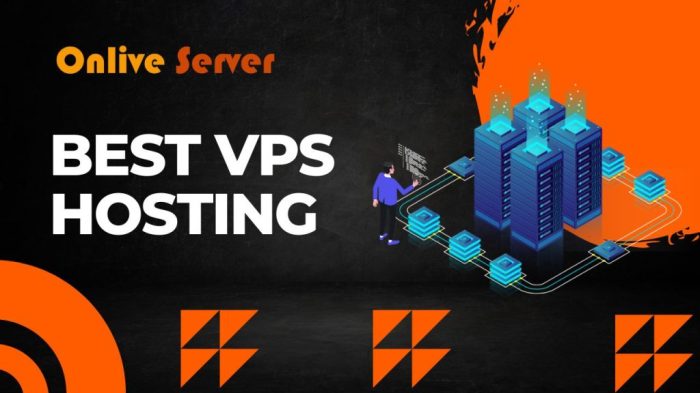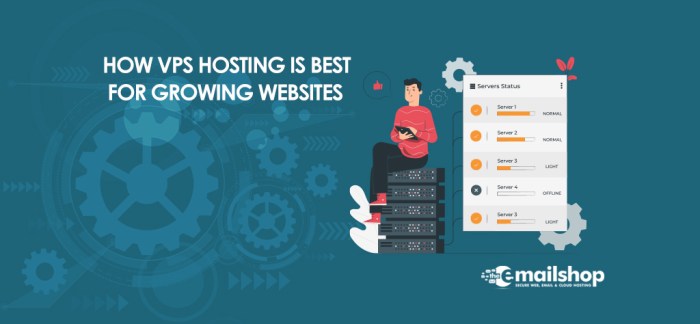Why VPS Hosting is the Best Choice for Growing Websites? As your website gains traction and user engagement skyrockets, the demand for enhanced performance, security, and control becomes paramount. This is where VPS hosting steps in, offering a compelling solution that empowers your website to scale seamlessly and achieve its full potential.
VPS hosting, or Virtual Private Server hosting, provides a dedicated portion of a physical server’s resources, granting you a virtual environment with its own operating system, software, and administrative privileges. Unlike shared hosting, where multiple websites share a single server, VPS hosting gives you the power and flexibility to manage your website’s resources independently, ensuring optimal performance and security.
Understanding VPS Hosting
VPS hosting is a type of web hosting that provides a more powerful and flexible solution than shared hosting. It offers a dedicated portion of a physical server’s resources, providing a virtualized environment for your website. This allows for better performance, security, and control compared to shared hosting, where multiple websites share the same server resources.
The Concept of Virtualization
Virtualization is the process of creating a virtual version of a physical resource, such as a server, operating system, or even a network. It allows you to run multiple instances of an operating system or application on a single physical machine, as if they were separate physical machines. Imagine a single computer with multiple virtual partitions, each running its own operating system and applications.
This is similar to how VPS hosting works, where each virtual server has its own dedicated resources, operating system, and software.
Key Features of VPS Hosting
- Dedicated Resources: Unlike shared hosting, where resources are shared among multiple websites, VPS hosting provides a dedicated portion of server resources for your website. This ensures that your website’s performance is not affected by other websites on the server.
- Root Access: VPS hosting typically provides root access, giving you complete control over the server environment. This allows you to install and configure software, manage security settings, and optimize performance.
- Enhanced Security: VPS hosting offers a higher level of security than shared hosting. Each virtual server is isolated from other virtual servers on the same physical machine, reducing the risk of security breaches.
- Scalability: VPS hosting is scalable, meaning you can easily upgrade your resources as your website’s traffic and demands grow. This allows you to adjust your hosting plan without having to migrate your website to a new server.
Benefits of VPS Hosting for Growing Websites

As your website gains traction and attracts more visitors, the need for robust hosting solutions becomes paramount. VPS hosting emerges as an ideal choice, offering a compelling blend of performance, security, and scalability that can accommodate the growing demands of your online presence.
Enhanced Performance and Speed
VPS hosting provides dedicated resources, ensuring that your website experiences optimal performance and speed. Unlike shared hosting, where resources are shared among multiple websites, VPS hosting allocates a specific portion of the server’s resources exclusively to your website. This dedicated allocation guarantees consistent performance, even during peak traffic hours.
- Faster Loading Times: With dedicated resources, your website’s pages load quickly, enhancing user experience and reducing bounce rates.
- Improved Responsiveness: VPS hosting ensures that your website responds promptly to user requests, preventing delays and frustration.
- Reduced Downtime: Dedicated resources minimize the risk of performance degradation due to other websites sharing the same server. This translates to less downtime and a more reliable online experience for your visitors.
Enhanced Security and Control
VPS hosting empowers you with greater control over your website’s security and environment. You have root access to your virtual server, allowing you to install and configure security software, manage user permissions, and customize your server settings to meet your specific security needs.
- Stronger Security Measures: With root access, you can implement robust security measures, such as firewalls, intrusion detection systems, and anti-malware software, to safeguard your website from threats.
- Isolated Environment: VPS hosting isolates your website from other websites hosted on the same physical server. This isolation minimizes the risk of security breaches originating from other websites.
- Greater Control: You have the flexibility to customize your server environment, including operating system, software, and security settings, to align with your specific requirements.
Choosing the Right VPS Hosting Plan

Choosing the right VPS hosting plan is crucial for ensuring your website’s performance, scalability, and overall success. It involves considering your website’s current needs, future growth potential, and budget constraints.
Factors to Consider When Selecting a VPS Hosting Plan
When selecting a VPS hosting plan, several factors are crucial to ensure you choose the best option for your website’s needs. These factors include:
- Website Traffic: Estimate the average and peak traffic your website receives. This will determine the resources needed to handle the load efficiently.
- Storage Space: Consider the amount of data your website requires. This includes website files, databases, and any other content you store.
- RAM: Random Access Memory (RAM) is essential for website performance. Websites with higher traffic require more RAM to handle multiple requests simultaneously.
- CPU Power: The central processing unit (CPU) handles website processing tasks. Websites with complex functionalities or large databases may need more powerful CPUs.
- Operating System: Select an operating system compatible with your website’s software and applications. Popular options include Linux and Windows.
- Security Features: Ensure the VPS hosting provider offers security features such as firewalls, malware protection, and regular security updates to protect your website from threats.
- Scalability: Choose a provider that allows for easy scaling of resources as your website grows. This ensures your website remains performant even as traffic increases.
- Customer Support: Reliable customer support is essential for resolving any technical issues promptly. Consider providers offering 24/7 support via phone, email, or live chat.
- Pricing: Compare prices from different providers, considering the features and resources offered. Ensure the price aligns with your budget and website’s needs.
Comparing VPS Hosting Providers
Once you’ve identified the key factors to consider, it’s time to compare different VPS hosting providers. Consider the following:
- Pricing: Compare the prices of different VPS plans offered by various providers. Look for plans that offer the best value for your budget and resources.
- Features: Evaluate the features offered by each provider, such as storage space, RAM, CPU power, operating system options, and security features. Choose a provider that offers the features you need.
- Customer Support: Research the customer support reputation of each provider. Look for providers offering 24/7 support, multiple communication channels, and a history of resolving issues efficiently.
- Performance: Consider the provider’s server location and network infrastructure. Choosing a provider with a strong network and strategically located servers can improve website performance and reduce latency.
- Reputation: Check the provider’s reputation and read reviews from other users. This can provide insights into their reliability, performance, and customer service quality.
VPS Hosting Plans and Resources, Why VPS Hosting is the Best Choice for Growing Websites
Here is a table showcasing different VPS hosting plans and their corresponding resources:
| Provider | Plan Name | CPU Cores | RAM | Storage | Price |
|---|---|---|---|---|---|
| HostGator | VPS Cloud 1 | 1 | 2 GB | 50 GB | $29.95/month |
| Bluehost | VPS Standard | 2 | 4 GB | 120 GB | $39.99/month |
| DigitalOcean | Droplet (Basic) | 1 | 1 GB | 25 GB | $5/month |
| Linode | Linode 1024 | 1 | 1 GB | 24 GB | $5/month |
| Vultr | VPS Instance (Basic) | 1 | 1 GB | 25 GB | $5/month |
Managing Your VPS Server: Why VPS Hosting Is The Best Choice For Growing Websites
While the benefits of VPS hosting are numerous, it’s important to remember that managing a VPS server requires a slightly higher level of technical proficiency compared to shared hosting. However, with the right knowledge and tools, managing your VPS can be straightforward and empowering. This section will guide you through the process of setting up, configuring, and maintaining your VPS server.
Setting Up and Configuring Your VPS Server
The initial setup of your VPS server involves several steps, including choosing an operating system (OS), configuring security settings, and installing essential software.
- Choosing an Operating System (OS): The first step is to select an OS for your VPS. Popular choices include Linux distributions like Ubuntu, CentOS, Debian, and Fedora. Your choice depends on your familiarity with the OS, the software you intend to run, and the level of support offered by your hosting provider.
- Configuring Security Settings: Security is paramount for any server. After installing your chosen OS, you’ll need to configure security settings to protect your server from unauthorized access and malicious attacks. This involves creating strong passwords for your user accounts, enabling firewalls, and configuring access control lists (ACLs).
- Installing Essential Software: Once your OS is set up and secured, you’ll need to install essential software packages, such as a web server (Apache or Nginx), a database server (MySQL or PostgreSQL), and a programming language interpreter (PHP, Python, or Ruby).
Installing and Managing Web Server Software
Web server software is the foundation of your website, handling requests from visitors and delivering web pages. Two popular web server choices are Apache and Nginx.
- Apache: Apache is a widely used and stable web server, known for its flexibility and extensive support. To install Apache on your VPS, you can use the package manager of your chosen OS. For example, on Ubuntu, you would use the following command:
sudo apt-get install apache2. - Nginx: Nginx is a lightweight and high-performance web server, often preferred for its speed and efficiency. You can install Nginx using the package manager of your OS. On Ubuntu, you would use:
sudo apt-get install nginx.
After installing your chosen web server, you can manage it using its configuration files. These files define how the web server handles requests, redirects traffic, and interacts with other services. For example, you can configure Apache using the /etc/apache2/apache2.conf file and Nginx using the /etc/nginx/nginx.conf file.
Server Maintenance and Security Updates
Regular server maintenance and security updates are crucial for ensuring the stability, security, and performance of your VPS.
- Regular Backups: It’s essential to create regular backups of your server’s data to protect against data loss due to hardware failures, software errors, or malicious attacks. You can use tools like rsync or a dedicated backup solution to automate the backup process.
- Security Updates: Software vulnerabilities are constantly discovered, and it’s important to keep your OS and installed software updated with the latest security patches. This helps prevent attackers from exploiting vulnerabilities and compromising your server.
- Monitoring Server Performance: Monitoring your server’s performance helps identify potential issues early on, allowing you to address them before they impact your website’s availability. You can use monitoring tools like Nagios or Zabbix to track CPU usage, memory consumption, disk space, and other vital metrics.
VPS Hosting for Specific Website Needs

VPS hosting is an excellent option for websites with growing traffic and resource demands. It offers a balance between shared hosting’s affordability and dedicated hosting’s power and flexibility. But how does VPS hosting benefit different types of websites? Let’s explore the advantages of VPS hosting for e-commerce websites, blogs, and content-heavy platforms.
VPS Hosting for E-commerce Websites
E-commerce websites rely heavily on performance, security, and scalability. VPS hosting provides the necessary resources to handle the demands of online stores.
- Enhanced Performance: VPS hosting provides dedicated resources, ensuring faster loading times and improved user experience, crucial for converting online shoppers.
- Security: VPS hosting offers greater security than shared hosting, as each virtual server is isolated, reducing the risk of other websites affecting your e-commerce platform.
- Scalability: As your e-commerce business grows, you can easily scale your VPS resources to accommodate increased traffic and transactions.
Examples of successful e-commerce websites using VPS hosting include Amazon, Etsy, and Shopify. These platforms rely on VPS hosting to provide a secure, reliable, and scalable environment for their online marketplaces.
VPS Hosting for Blogs
Blogs can benefit from VPS hosting, especially those with high traffic and multimedia content.
- Resource Allocation: VPS hosting provides dedicated resources, ensuring faster page loading times, even with heavy images and videos.
- Improved Performance: VPS hosting helps prevent slowdowns during peak traffic periods, crucial for maintaining reader engagement and avoiding lost visitors.
- Customization: VPS hosting allows you to customize your server environment, optimizing it for your blog’s specific needs and performance.
Popular blogs like TechCrunch and Mashable leverage VPS hosting to manage their high traffic and multimedia content, providing a seamless experience for their readers.
VPS Hosting for Content-Heavy Platforms
Content-heavy websites, like streaming services, video platforms, and online learning platforms, require significant resources to handle large files and high bandwidth demands.
- High Bandwidth: VPS hosting provides ample bandwidth, ensuring smooth streaming and fast file downloads for users.
- Storage Capacity: VPS hosting offers more storage space compared to shared hosting, allowing you to host large media files and databases.
- Performance Optimization: VPS hosting allows you to optimize your server environment for specific content delivery needs, ensuring a high-quality user experience.
Examples of content-heavy platforms using VPS hosting include Netflix, YouTube, and Udemy. These platforms rely on VPS hosting to deliver high-quality content to millions of users worldwide.
VPS Hosting Needs for Different Website Types
| Website Type | CPU Cores | RAM | Storage | Bandwidth |
|---|---|---|---|---|
| E-commerce Website (Small to Medium) | 2-4 | 4-8 GB | 50-100 GB | 1-2 TB |
| Blog (High Traffic) | 1-2 | 2-4 GB | 20-50 GB | 500-1000 GB |
| Content-Heavy Platform | 4-8 | 8-16 GB | 100-200 GB | 2-4 TB |
These are general recommendations, and your specific VPS hosting needs may vary based on your website’s traffic, content, and features. It’s essential to consider your website’s unique requirements when choosing a VPS hosting plan.
In conclusion, VPS hosting emerges as the ideal choice for growing websites seeking enhanced performance, security, and control. With its dedicated resources, scalability, and customizable environment, VPS hosting empowers you to unlock the full potential of your website and deliver a seamless user experience. As your website evolves, VPS hosting provides the foundation for sustained growth and success, ensuring that your online presence remains robust, secure, and highly responsive.
FAQ
What are the key differences between VPS hosting and shared hosting?
VPS hosting provides a dedicated portion of a physical server’s resources, offering greater control, performance, and security compared to shared hosting, where multiple websites share the same server.
How much does VPS hosting typically cost?
VPS hosting plans vary in price depending on factors such as resources, features, and provider. Prices can range from a few dollars per month to several hundred dollars per month.
Is VPS hosting suitable for beginners?
While VPS hosting offers greater control, it requires a basic understanding of server administration. However, many providers offer user-friendly interfaces and support resources to make managing a VPS server easier.
What are the benefits of using a managed VPS hosting service?
Managed VPS hosting services handle server management tasks such as security updates, backups, and performance optimization, allowing you to focus on your website’s content and growth.
Can I upgrade my VPS hosting plan later if my website needs more resources?
Yes, most VPS hosting providers offer flexible upgrade options, allowing you to scale your resources as your website grows.